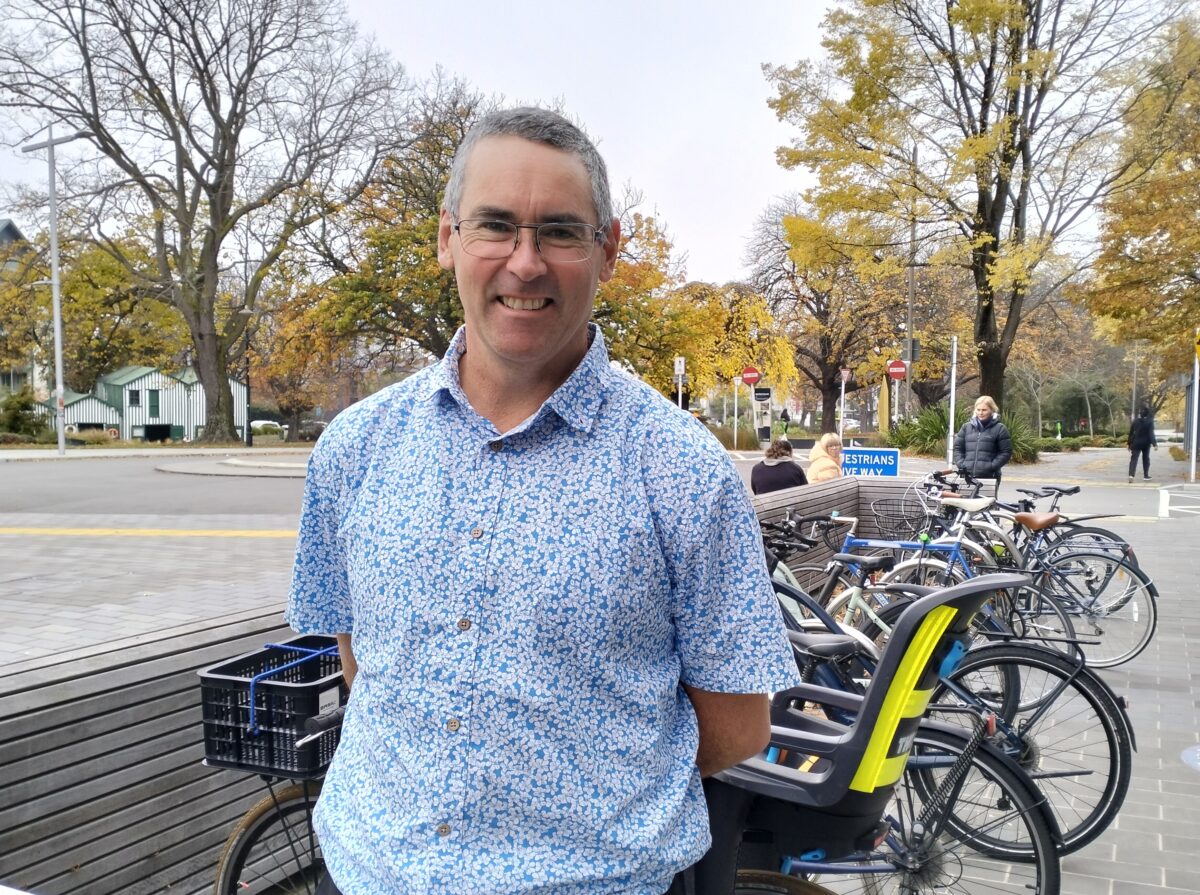I wasn’t sure where to start when I talked with Steven Muir. With his Sunday afternoon cycling church (and the book he wrote about it)? With his role in setting up community initiatives like ICECycles and, more recently, the Aranui Bike Fix-Up? With his small business making cycle trailers and low-cost bike accessories (child seats, racks and bike light attachments) for those in need? With the various events he’s organised (such as the Supermarket Challenge and the Fossil Fuel Free Coast to Coast to Coast) to demonstrate how people can use a bike and trailer for many more transport purposes than they think?
These are just some of the ways Steven Muir has been actively involved in supporting everyday cycling in Christchurch over the past 20 years. He’s also been a regular contributor to this website, often highlighting the weird and wonderful loads he’s transported by bike, and runs annual workshops for those wanting to build their own wooden bike trailer. In 2012, his efforts were recognised when he picked up the Cycling Champion award at the New Zealand walking and cycling conference.
Our conversation focused on what motivates him, and the things he spends most time on these days – getting young people into cycling through the Aranui Bike Fix-Up and encouraging greater use of cycle trailers (when he’s not working in his day job as a Medical Physicist, that is).
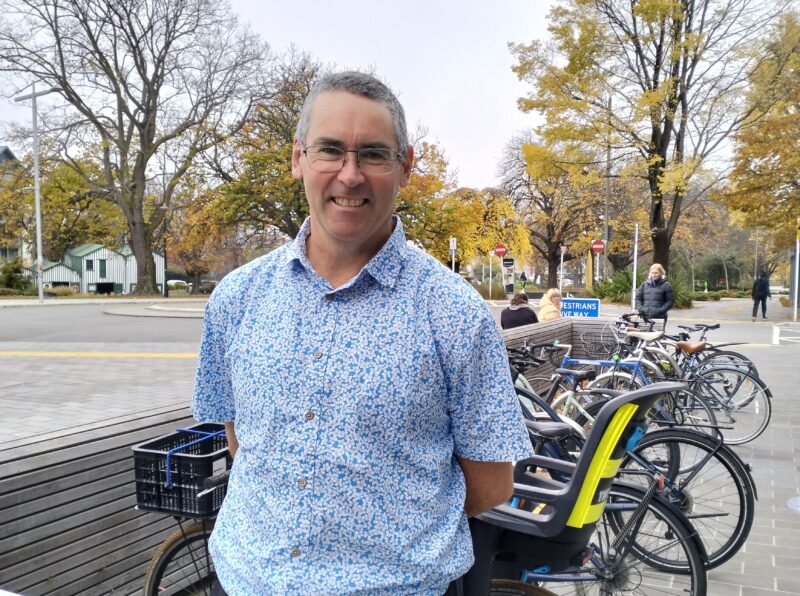
A climate change response
Steven’s cycling activism is a response to climate change. He first became aware of climate change in the early 1990s and made a deliberate move to reduce his carbon footprint in the early 2000s.
Part of Steven’s response was to connect his concern for the wellbeing of the planet with his faith – which led to the Sunday afternoon cycling church. He says he feels most spiritual when he is on his bike in the hills, and the idea behind the cycling church was to encourage a sense of wellbeing and connection with nature. He’s since incorporated this idea into his work with the Aranui Bike Fix-up, providing opportunities for young people to go out on rides and experience that same sense of wonder and connection that comes from being outdoors.
Another big focus for Steven was on his means of transport. Already a regular cyclist, he aimed to redouble his efforts and substitute as many car trips as possible with trips by bicycle. He examined his everyday car use and found that most trips were prompted by a need to carry stuff – such as getting groceries, picking up hardware supplies and transporting his bass guitar and amplifier. Taking a backpack with him on his bike simply wasn’t going to cut it for many of these loads so it wasn’t long before he made himself a cycle trailer – and was then trying to convince other people to use one too.
Steven sees transport as low-hanging fruit when it comes to reducing greenhouse gas emissions. About 20 per cent of New Zealand’s emissions relate to transport and Steven points out that many car trips are unnecessary and could easily be done by bike and trailer instead. He describes making the switch as win-win because of the other gains that come with cycling – it’s fun and healthy and, because you can easily talk to people around you when you’re on a bike, it fosters social connection too.
Aranui Bike Fix-up
Developing a lifelong habit of cycling among young people has the potential for a big reduction in future carbon emissions. This is where the Aranui Bike Fix-up comes in.
Every Thursday afternoon, from 3pm to 6pm, Steven sets up the Aranui Bike Fix-up on the grounds of the Breezes Road Baptist Church. The church puts on afternoon tea, and he’s joined by four or five other volunteers, ready to help people who pop in to get their bikes fixed. The idea is that people develop skills in restoring their own bikes, making use of available tools and spare parts and the experience of the volunteers. This has the dual effect of keeping people riding and keeping the bike in service for many more years.
The group also accepts donated bikes that it gives away to young people in the area who are prepared to fix them up. Steven says they recently gave away their 1000th bike – which is a lot of bikes rescued from the scrap heap and a lot of young people using a bicycle to get around.
An important part of the initiative is organising weekend rides for young people who might not otherwise get the opportunity. So, they’ll go cycling on the Port Hills or Bottle Lake Forest (for example). Once a year, they get the chance to bike all the way to Akaroa – they might not make it the whole way but can come back and try again another year. And they’ll do multi-day trips on South Island cycle trails like the West Coast Wilderness Trail, the Old Ghost Road, and the Queen Charlotte Track. Sometimes, they will do an overnight camp close to home (like Godley Head or Spencer Park) so the young people can get used to riding with panniers and carrying their own camping gear.
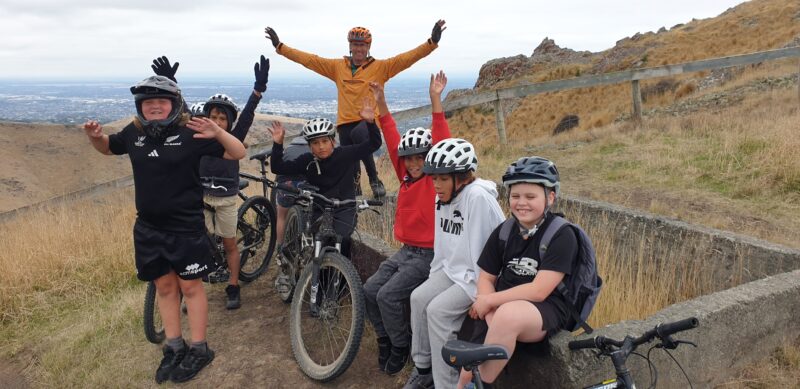
The group maintains a bike library to make sure there are always good-quality bikes available for the weekend rides (which other community groups can use too). And Steven’s low-cost bike racks and bike light attachments come in handy for the longer trips and night rides.
Steven estimates he contributes about 15 hours a week to the initiative – sourcing parts, making funding applications, being there on Thursday afternoons, and organising and attending weekend rides. A part-time youth worker has recently been employed, who is developing relationships with the young people on Thursdays and taking on organisation of the weekend rides. But they can always do with more volunteers, and will happily accept more bikes, especially good bikes that can be used for the bike library.
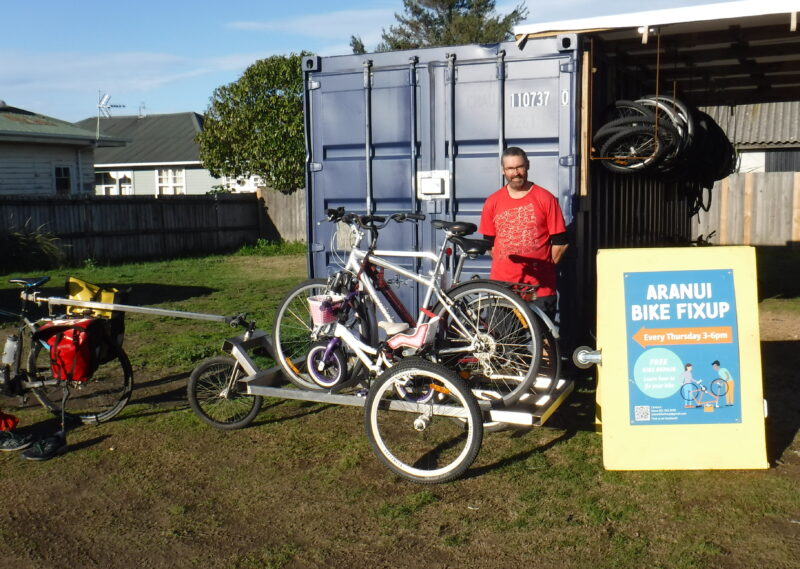
Cycle trailers
Thursday morning is when Steven makes his cycle trailers. He makes them in a range of sizes, for different purposes, and has even designed trailers for carrying a kayak, surfboard, or stand-up paddleboard (which also work well for carrying six-metre lengths of metal for building more trailers). And yes, they can be safely towed up and down hills. So far, he’s sold 670 trailers, mostly to people using them for household shopping. He says the kayak trailers are also popular (and easier than lifting a kayak onto a car) and gardening groups use his bigger trailers for shifting bales of straw, compost and other supplies.
Steven is a tireless advocate for cycle trailers, and he’ll lend one of his trailers to anyone wanting to try them out for free. He’s quick to point out that cycle trailers and cargo bikes can be used to carry all sorts of loads that don’t fit in a car (as well as things that can). He mentions, for example, a three-seater outdoor couch his wife bought, and the time he carried an enormous letter K for someone he met in Latimer Square on his way home.
If you take a quick look at his contributions to the Cycling in Christchurch website, you’ll find many more examples of the things he’s managed to transport by bike – banana boxes, mattresses, billboards, a bubble machine, and a pile of bikes. And then there’s his “clean, green limousine” – transporting people (and their luggage) to and from the airport via a tandem bicycle and a bike trailer. And his tales of the towing kayaks through the Porters Pass for the Fossil Fuel Free Coast to Coast to Coast.
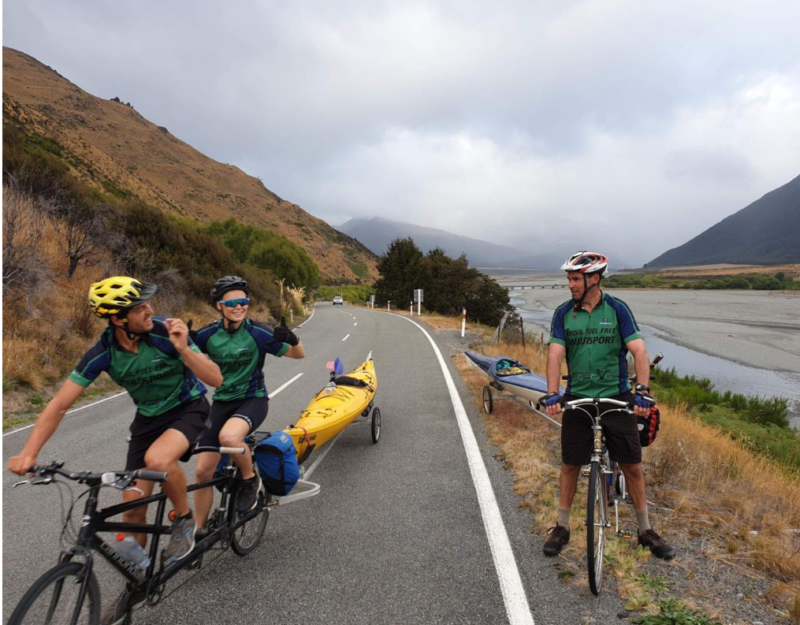
In sharing these stories, Steven has shown what is possible and paved the way for more of us to start transporting things by bike, and thereby reduce our own carbon footprint.
In a nice example of his various interests coming together, Steven tells me he also goes fruit foraging by bike so he can provide healthy waste-free snacks for the Aranui Bike Fix-Up rides. He’d noticed many young people were coming along with packaged snacks, so he started harvesting fruit from the residential red zone and friends’ gardens. He takes a ladder along in his cycle trailer, transports the fruit home, and uses it to make snacks like fruit leather and muffins. A win for the kids and for the environment.
Steven the cyclist
Steven owns an impressive collection of bikes – a cargo bike, three mountain bikes, an e-bike, a commuter bike, a road bike, a folding bike, a tandem, and a range of spares to loan to others. They have all been home-built or fixed up from bikes that would likely have been scrapped otherwise. They all serve different purposes, and he likes to use just the right bike for each ride.
He says he’s always enjoyed the freedom provided by cycling – right from the early days of biking to kindergarten. He tries to go for a ride up the hills a few times a week and identifies the Rapaki Track as his favourite ride. While he likes to push himself sometimes, he appreciates his surroundings more when he’s cycling at a slower pace (a necessity when riding with young people). For Steven, what’s important is having that sense of connection with nature.
Final words
Steven admits to being a little less optimistic about the wellbeing of the planet than he was when he first started trying to change the world. He notes that Covid shut down transport activity and drastically reduced emissions, showing what could be done, but people have returned to their cars since.
However, he is not giving up. He’s still living ethically and still trying to get more people riding bikes and experiencing the outdoors more often. He takes every chance he can to spread the word and will, for example, talk to new workmates about cycling (and offer to lend them a bike) before they establish their transport habits.
Steven says he’d like people to think about whether or not they need to take the car, and would love to see more people borrowing his cycle trailers – even if for just one ride. His advice to anyone thinking about cycling for transport is to just do it. Make it a priority and get on your bike as much as you can.

